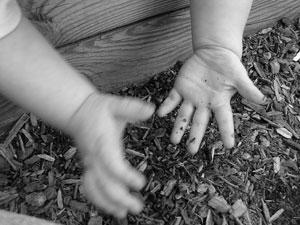A natural playground grows in Boston
(Image by Onion (cc:by-nc-nd))
This story was originally covered by PRI’s Living on Earth. For more, listen to the audio above.
Parents sometimes struggle to find green space for children in Boston’s Dorchester neighborhood. One exception is Crispus Attucks preschool. The school recently converted their traditional playground—with its plastic slide and metal jungle gym—into a green oasis filled with grass, trees and water for children to play in. Ebony Payne, of PRI’s Living on Earth and its sister program Planet Harmony, explained the project:
Natural playgrounds like this can be found in suburbs, but this is the first of its kind in Boston’s inner city. It’s an environment designed to stimulate the senses. Discover smooth stones, and sweet smelling plants. The goal is to foster interaction and create a sense of intimacy with the natural world.
Each playground class is given a small plot of land where kids can plant their own vegetables that are harvested and eaten at the end of the season. School administrators hope the vegetable gardens could instill better eating habits among the students, a third of whom are already considered obese.
“It’s really helpful to these children who don’t see things growing and think that all fruits and vegetables come from the Stop and Shop,” Leslie Christian, President of Crispus Attucks, told Living on Earth. “So they’ll learn where they come from and then they’ll appreciate eating them.”
When children aren’t exposed to enough play and green spaces, they suffer from a kind of “nature deficit disorder,” Richard Louv wrote for Psychology Today. The increasing alienation of children from nature, especially in their formative years, exacts a deep psychological cost. Still, people are beginning to realize the problems, and take action to reunite kids with the outdoors. He writes:
A growing movement will continue to make the case that a meaningful human relationship with nature, shaped in children’s formative years, is crucial to our society’s practice of stewardship, its sense of community, and the strength of family bonds.
The playground at Crispus Attucks didn’t come cheap. The school was forced to raise thousands of dollars from privately funded philanthropic sources in order to build the area. Administrators, though, maintain that the natural playground is well worth the costs. “It’s a lot better” than the old playground, teacher Diane Cox told Living on Earth. “Its something new for them, they’re not used to seeing something like this on an everyday basis.”
Hosted by Steve Curwood, “Living on Earth” is an award-winning environmental news program that delves into the leading issues affecting the world we inhabit. More “Living on Earth.”
